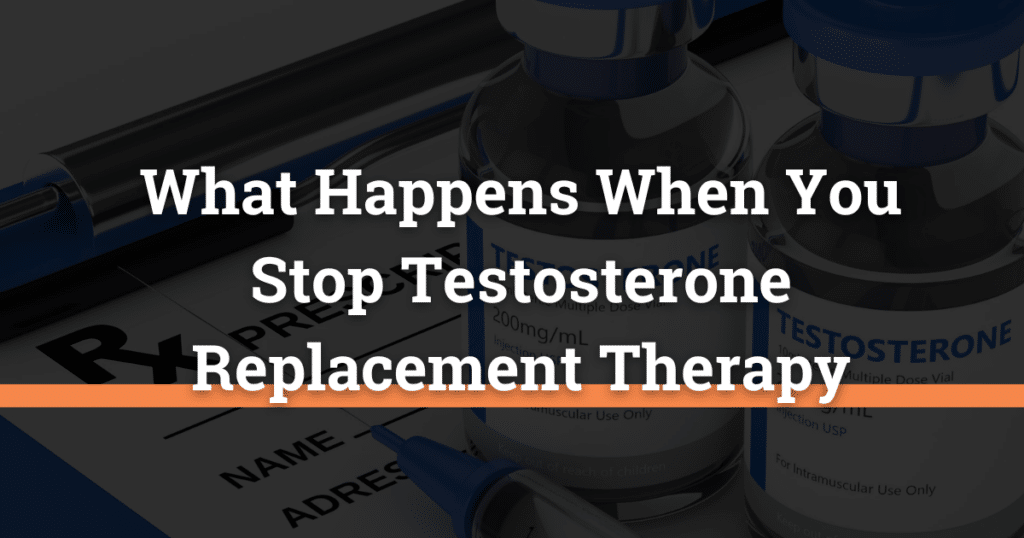You just found out you have low testosterone. Now you’re considering testosterone replacement therapy. But, you’re not sure how it works. The good news is that you’re not alone. Many people dealing with low testosterone treat it by taking testosterone replacement therapy.
So, once you get started with TRT, is it a lifelong commitment? Or, can you stop? And, are there any risks to stopping treatment?
In this article, we’ll address your most common questions about testosterone treatment therapy including how it works, what happens if you stop, and if it’s the right treatment for you. Let’s begin.
What Is Testosterone Replacement Therapy Used For?
So what exactly is TRT?
Testosterone replacement therapy (TRT) is a popular treatment for those struggling with low testosterone levels. Testosterone is the hormone responsible for several bodily functions including body/facial hair growth, sex drive, and muscle mass.
Typically, but not always, TRT patients deal with low testosterone because of either aging or an underlying medical condition. Low testosterone can lead to a variety of symptoms including fatigue, low sexual performance, thinning hair, weight gain, and erectile dysfunction, just to name a few.
If you’re struggling with low testosterone, it’s important to treat it so you can get back to normal life. TRT is a safe and effective way to optimize your testosterone levels, especially when taken under medical supervision.
The treatment has been shown to help fight low libido, increase energy, increase muscle mass, and combat depression.
What Happens If You Stop TRT?
Low testosterone primarily impacts males who are going through the natural aging process and whose testosterone levels are expected to remain low for years. Because of this, testosterone replacement therapy is typically a long-term commitment.
Since TRT is intended to raise testosterone levels to combat the side effects of hormone imbalance, stopping treatment will result in an onset of previous symptoms of low testosterone. In some cases, patients report a rapid onset of the symptoms they experienced prior to treatment.
Your body will revert to the state it was in before you started taking the treatment. Many patients who stop TRT report lower muscle mass, thinning hair, sexual performance issues, general weakness, and increased weight gain.
Is It Safe to Stop Taking Testosterone Replacement Therapy?
It is not advised to stop taking any medical treatment abruptly, including TRT. It’s wisest to consult with an expert before ceasing any medication.
While it’s unlikely that stopping TRT quickly will result in serious harm, it will most likely make your body feel uncomfortable. Depriving your body of testosterone suddenly will create a shock to your body.
Remember to always listen to the advice of your doctor before stopping or starting treatment, especially if you’re thinking about making any sudden changes.
Why Should You Start Testosterone Replacement Therapy?
Before you decide to start or stop TRT, analyze all the facts and learn from trusted professionals. This is important since there are several myths about testosterone replacement therapy.
TRT is prescribed to men who are struggling with low testosterone. The medical name for low testosterone is “hypogonadism” which means your body doesn’t naturally produce enough on its own.
While there are a few ways you can support your testosterone levels naturally, such as diet and exercise, TRT is an effective solution to further stabilize your testosterone levels.
How Long Does it Take for TRT to Start Working?
Testosterone replacement therapy is different for everybody. Since everyone’s body is different biologically, the length of time it takes to begin seeing results will vary from person to person.
If you only need a small boost of testosterone to get back to normal, symptoms can improve in a matter of weeks. However, most TRT patients begin seeing results in about four to eight weeks on average after starting their testosterone treatment plan.
Results take a few weeks because your body takes a while to stabilize from the increase in testosterone. If you’re not seeing positive results after a few weeks, it doesn’t necessarily mean TRT doesn’t work for you. Instead, it likely just means that you’re either dealing with lower-than-normal testosterone levels or your body needs more time to adjust than others.
Speak with a specialist frequently about how you’re feeling as you start your TRT program. Sometimes, a slight adjustment may be necessary as you begin your treatment.
Get Back on Track With Limitless Male
Are you experiencing low testosterone?
Whether you’re looking for a solution to improve muscle mass, sex drive, or weight loss, the professionals at Limitless Male Medical Clinic are here to answer all your questions to help you regain your youth.
Feel free to reach out to our trusted experts to learn more about how you can improve testosterone levels naturally and if testosterone replacement therapy is the right fit for you.




